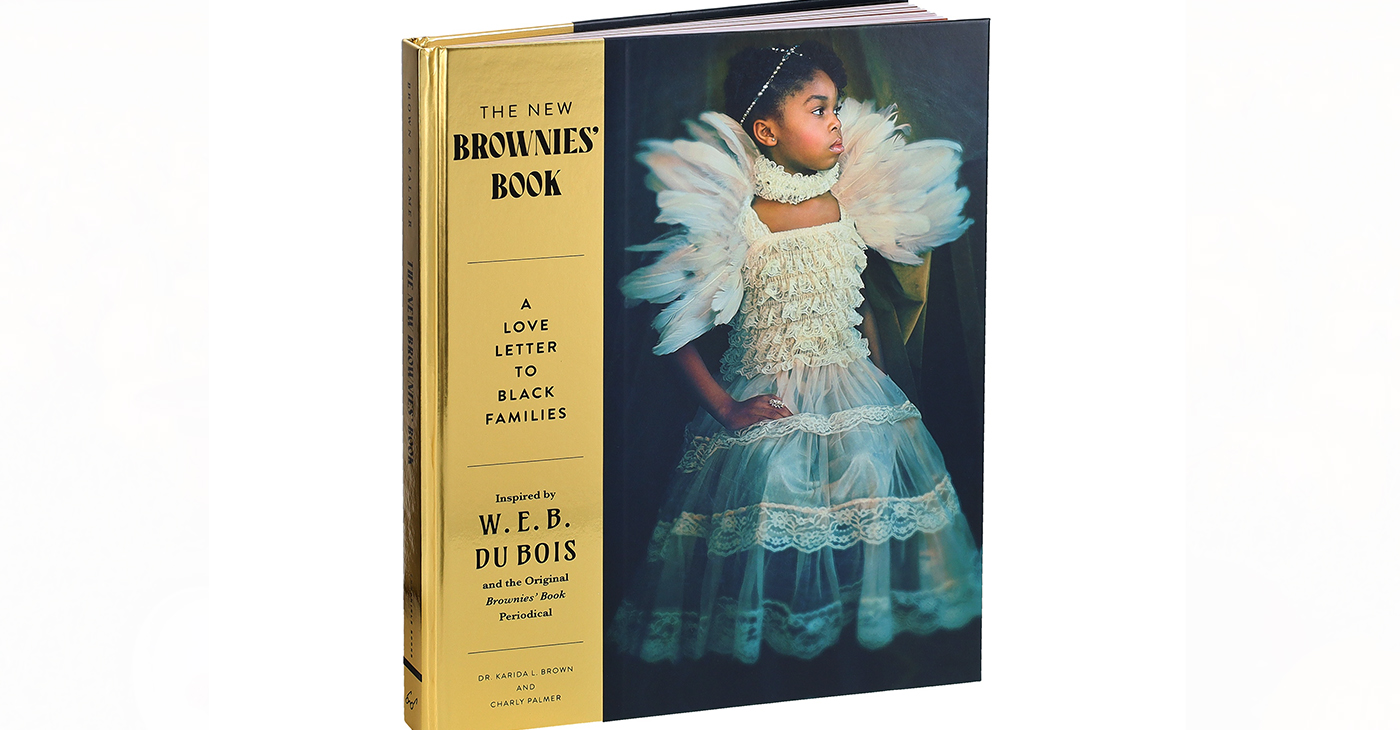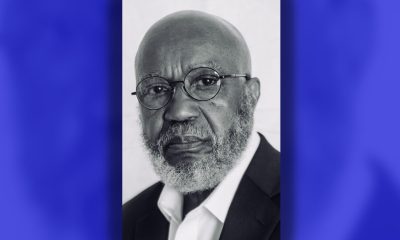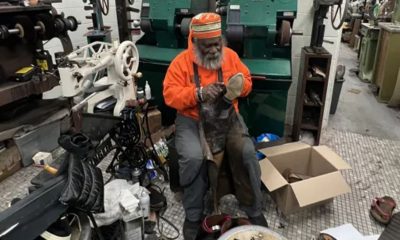Activism
In ‘The New Brownies’ Book,’ Authors Build on Magazine for Black, Brown Families During Harlem Renaissance
Ten years after the launching of the ‘infamous’ The Crisis magazine, W.E.B. Du Bois, Augustus Granville Dill and Jessie Redmon Fauset had another idea: they called it “The Brownies’ Book,” though it was really a magazine that sold for less than two dollars for six issues, or fifteen cents for a single issue.

By Terri Schlichenmeyer
The Bookworm Sez, LLC
The kids are back in school now and already, your family’s going in six different directions.
You’re busy, between sports, extracurricular activities, work commitments, family gatherings, and community activity. If there was a meaningful way to get everybody together at once, you’d be all over that so grab “The New Brownies’ Book” by Dr. Karida L. Brown and Charly Palmer and take a hint from Grandma’s time.
Ten years after the launching of the ‘infamous’ The Crisis magazine, W.E.B. Du Bois, Augustus Granville Dill and Jessie Redmon Fauset had another idea: they called it “The Brownies’ Book,” though it was really a magazine that sold for less than two dollars for six issues, or fifteen cents for a single issue.
It was 1920, Jim Crow laws were in effect, and the founders’ intention was that the publication would “serve as a much-needed medium for Black and Brown children,” by showing them what people of color had contributed to the world. It was also something white families could use and learn from, too.
“… (I)t was,” say Brown and Palmer, “a crown jewel of African American children’s literature.”
This book, meant to “evoke the spirit of… [the] original Brownies’ book,” pulls together dozens of original stories, poems, plays, essays, lessons, and artwork that mirrors what Du Bois had in mind more than a century ago.
Here, you’ll find tales of ancestors and why it’s important to know yours. You’ll find games for the whole family to play, including even the littlest kids. You’ll find photos and reproductions of “Brownies’ Book” pages from the 1920s and new artwork from a variety of Black artists.
There’s humor in some of these stories, and one is a fun challenge for pre-teens. There are tales for older kids here, pages that help teach morality and empathy, stories to read aloud to a grade-schooler, stories that seem to end abruptly but that beg for meaningful discussion, and biographies of “she-roes” and other giants in Black history.
“The New Brownies Book” absolutely lives up to its subtitle: it is, indeed, “a love letter to Black families.” It’s also pretty sweet on art and poetry, too.
Many of the essays and stories, though, may confound readers who are not prepared for their abrupt endings. It’s as if the pages have run out and that’s that – but look again. Those ends-too-quickly tales invite a child to imagine what happened next or to think of a better storyline. They are ready-made to teach a child to be a storyteller, and for families to discuss.
Don’t think that this book is only for small children, though. This is the kind of reading that you can leave around for a teenager to find and browse, to provoke thought and spark ideas. There are inspirations inside here, as well as subtle lessons.
You can feel comfortable giving this to a family, new, old, or blended. It would be a great gift for your favorite babysitter or a grandparent, too. For your household, “The New Brownies’ Book” is a great addition.
“The New Brownies’ Book” is by Dr. Karida L. Brown and Charly Palmer
c.2023, Chronicle Books, $40.00, 208 pages.
Activism
Oakland Post: Week of April 24 – 30, 2024
The printed Weekly Edition of the Oakland Post: Week of April 24 – 30, 2024

To enlarge your view of this issue, use the slider, magnifying glass icon or full page icon in the lower right corner of the browser window. ![]()
Activism
Oakland Post: Week of April 17 – 23, 2024
The printed Weekly Edition of the Oakland Post: Week of April 17 – 23, 2024

To enlarge your view of this issue, use the slider, magnifying glass icon or full page icon in the lower right corner of the browser window. ![]()
Activism
Oakland Schools Honor Fred Korematsu Day of Civil Liberties
Every Jan. 30, OUSD commemorates the legacy of Fred Korematsu, an Oakland native, a Castlemont High School graduate, and a national symbol of resistance, resilience, and justice. His defiant stand against racial injustice and his unwavering commitment to civil rights continue to inspire the local community and the nation. Tuesday was “Fred Korematsu Day of Civil Liberties and the Constitution” in the state of California and a growing number of states across the country.

By Post Staff
Every Jan. 30, OUSD commemorates the legacy of Fred Korematsu, an Oakland native, a Castlemont High School graduate, and a national symbol of resistance, resilience, and justice.
His defiant stand against racial injustice and his unwavering commitment to civil rights continue to inspire the local community and the nation. Tuesday was “Fred Korematsu Day of Civil Liberties and the Constitution” in the state of California and a growing number of states across the country.
One OUSD school is named in his honor: Fred T. Korematsu Discovery Academy (KDA) elementary in East Oakland.
Several years ago, founding KDA Principal Charles Wilson, in a video interview with anti-hate organization “Not In Our Town,” said, “We chose the name Fred Korematsu because we really felt like the attributes that he showed in his work are things that the children need to learn … that common people can stand up and make differences in a large number of people’s lives.”
Fred Korematsu was born in Oakland on Jan. 30, 1919. His parents ran a floral nursery business, and his upbringing in Oakland shaped his worldview. His belief in the importance of standing up for your rights and the rights of others, regardless of race or background, was the foundation for his activism against racial prejudice and for the rights of Japanese Americans during World War II.
At the start of the war, Korematsu was turned away from enlisting in the National Guard and the Coast Guard because of his race. He trained as a welder, working at the docks in Oakland, but was fired after the bombing of Pearl Harbor in 1941. Fear and prejudice led to federal Executive Order 9066, which forced more than 120,000 Japanese Americans out of their homes and neighborhoods and into remote internment camps.
The 23-year-old Korematsu resisted the order. He underwent cosmetic surgery and assumed a false identity, choosing freedom over unjust imprisonment. His later arrest and conviction sparked a legal battle that would challenge the foundation of civil liberties in America.
Korematsu’s fight culminated in the Supreme Court’s initial ruling against him in 1944. He spent years in a Utah internment camp with his family, followed by time living in Salt Lake City where he was dogged by racism.
In 1976, President Gerald Ford overturned Executive Order 9066. Seven years later, the 9th Circuit Court of Appeals in San Francisco vacated Korematsu’s conviction. He said in court, “I would like to see the government admit that they were wrong and do something about it so this will never happen again to any American citizen of any race, creed, or color.”
Korematsu’s dedication and determination established him as a national icon of civil rights and social justice. He advocated for justice with Rosa Parks. In 1998, President Bill Clinton gave him the Presidential Medal of Freedom saying, “In the long history of our country’s constant search for justice, some names of ordinary citizens stand for millions of souls … To that distinguished list, today we add the name of Fred Korematsu.”
After Sept. 11, 2001, Korematsu spoke out against hatred and discrimination, saying what happened to Japanese Americans should not happen to people of Middle Eastern descent.
Korematsu’s roots in Oakland and his education in OUSD are a source of great pride for the city, according to the school district. His most famous quote, which is on the Korematsu elementary school mural, is as relevant now as ever, “If you have the feeling that something is wrong, don’t be afraid to speak up.”
-

 Activism4 weeks ago
Activism4 weeks agoOakland Post: Week of March 27 – April 2, 2024
-

 #NNPA BlackPress4 weeks ago
#NNPA BlackPress4 weeks agoBeloved Actor and Activist Louis Cameron Gossett Jr. Dies at 87
-

 Community2 weeks ago
Community2 weeks agoFinancial Assistance Bill for Descendants of Enslaved Persons to Help Them Purchase, Own, or Maintain a Home
-

 Activism3 weeks ago
Activism3 weeks agoOakland Post: Week of April 3 – 6, 2024
-

 Business2 weeks ago
Business2 weeks agoV.P. Kamala Harris: Americans With Criminal Records Will Soon Be Eligible for SBA Loans
-

 Activism2 weeks ago
Activism2 weeks agoOakland Post: Week of April 10 – 16, 2024
-

 Community2 weeks ago
Community2 weeks agoAG Bonta Says Oakland School Leaders Should Comply with State Laws to Avoid ‘Disparate Harm’ When Closing or Merging Schools
-

 Community1 week ago
Community1 week agoOakland WNBA Player to be Inducted Into Hall of Fame





















































